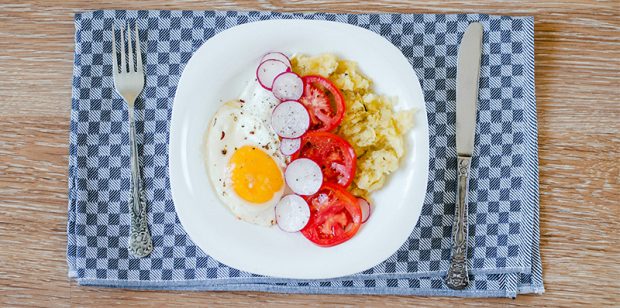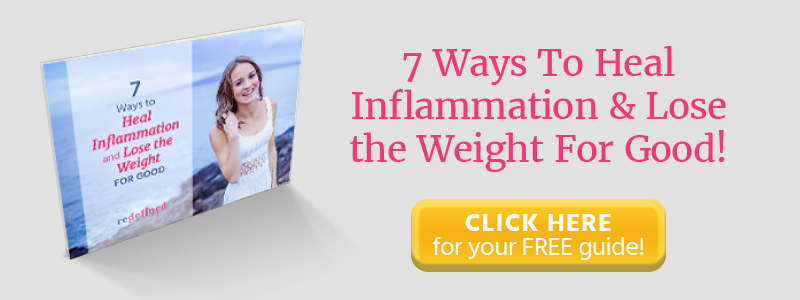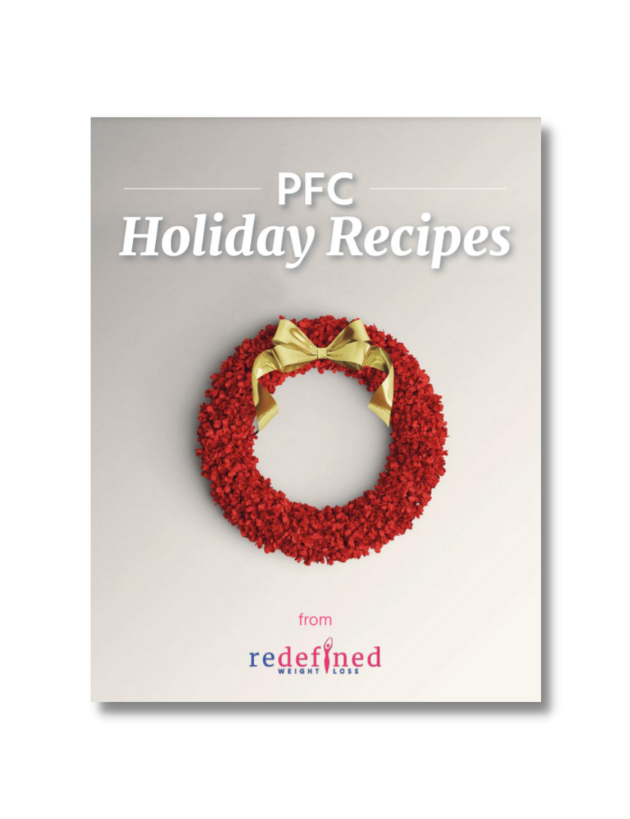You’ve got questions, I’ve got answers! Here’s a list of the most common questions you asked me after PFC Balanced Eating: Parts 1 and 2.
PFC FAQ’s:
Is PFC a low carbohydrate diet? Not necessarily. Eating balanced PFC leaves plenty of room for healthy carbs like vegetables and fruit. That said, by reducing processed food and added sugars; you will inadvertently eat a lower amount of carbs than people who eat a standard American diet. So it is safe to say that when eating the PFC way and incorporating more protein and fat, you will naturally eat less carbohydrates and more in balance.
How closely do you need to eat PFC together? The closer you can eat all three components of PFC together, the better. At minimum, try to always have a source of protein or healthy fat with your carbohydrate to promote balanced blood sugar levels.
Is there a general breakdown of percentages for how much of each PFC group to strive for? Everyone is different. To learn a lot more about how to make this PFC way of eating and living work for you, check out Bye Bye Belly Fat! I I designed and developed our flagship coaching program to help you implement all of these eating strategies into your lifestyle. We’ll take the burden off your shoulders and teach you and guide you. You don’t have to figure it out by yourself.
Can I go PFC on a vegetarian or vegan diet? It’s tricky. Being a healthy vegan or vegetarian requires careful planning. Vegan diets are pretty much just FC, and often times just C. I’ll be upfront and say that vegetarian and vegan diets simply aren’t as healthy as ones that contain animal protein, so I don’t recommend either of them. That said, I understand that people choose a vegetarian or vegan lifestyle for a lot of reasons, so I completely respect and honor your choice if you decide to not include meat in your diet. You will still reap many of the benefits of a PFC-balanced eating regimen. I’ve worked with many clients who choose to leave the meat out, and they have still managed to achieve weight loss and other results they were seeking. It’s just trickier, and I don’t think it’s as healthy.
While vegan literature will tell you that you can get plenty of protein from plants, you will have to consume a TON of carbohydrates to get there. For example, rice and beans are a popular plant combination touted by vegetarians and vegans for being a “complete protein” (containing all 22 essential amino acids). However, in a 1/2 cup of rice and beans, you’ll be consuming about 23 grams of carbs and only 5 grams of protein. In order to get to an adequate amount of protein (closer to 25 grams at a meal), you’d need to eat WAY TOO MANY carbohydrates which would result in a ride on the blood sugar roller coaster. This is why vegans often rely on processed meat look-alikes, which may contain lots of soy and other icky ingredients. I used to be a vegetarian, and I’ll be the first to admit that I ate a ton of carbohydrates —mostly in the form of processed, packaged foods.
If you’re willing to include fish and eggs, it makes things a heck of a lot easier. You can have eggs, fish, or a whey or beef protein powder at all of your meals and snacks, and despite missing out on some of the nutrients that meat contains, you should still be able to get in enough protein to feel great and reach your weight loss goal. You can replace the nutrients you’ll be missing out on from not eating meat with a multivitamin with B12 and iron supplements, but I would also strongly recommend working with a dietitian coach who can help you fill in these gaps and examine your individualized eating regimen to avoid nutritional deficiencies.
Can supplements really help? Yes…and they can also hurt. Supplements boost metabolism—but only if they’re the right ones. The wrong ones can cause more harm than good and actually slow down your metabolism. A recent study by the New York State Attorney General’s office revealed that 4 out of 5 supplements on the shelves of popular retailers (GNC, Target, Walgreens and Walmart) contain NONE of the herbs and ingredients listed on the labels! That’s why I finally took the initiative and created my own line of supplements that I have complete control over and you can trust! Wave goodbye to shady manufacturers and unethical labels. Redefined Vitamins® products are pharmaceutical-grade, which means they are regulated and made from only the finest ingredients.
Why do you recommend a bedtime snack? And why only FC before bed but PFC at all other meals and snacks? The right bedtime snack promotes stable blood sugar levels all night long. Blood sugars begin dropping after our last meal of the day, so to encourage stable blood sugars all night long, it’s essential to slightly bring them back up by eating something before going to bed. The ideal bedtime snack includes fat and carbohydrates. Bedtime is the ONLY time I recommend eating PFC, minus the P (simply because protein gives us energy which can interfere with sleep). Read more on bedtime snacks here.
Should you measure how much water you drink? It’s certainly important to stay hydrated and drink water; your body is comprised of about 60%water and just about every system in the body needs it to function. That said, you do not need to be a slave to it. Just like eating to stay ahead of our hunger, we should do the same with our thirst. Start your day off with a big glass of water, and drink water periodically throughout the day before you get thirsty. As they say, sometimes the best defense is a good offense! The best way to combat your hunger and thirst is to confront it first before it confronts you. When consuming alcohol, make sure you’re drinking a cup or two of water for each drink you’re tipping back and if you’re active in the warm summer weather it’s important to pay close attention to hydration.
What about hormones? It can be tough to keep weight off with crazy hormones. Underneath it all, if your hormones are imbalanced, the pieces of your weight loss puzzle can’t come together. We see these problems every day with our clients. Eating balanced PFC meals and snacks is the first step, but your real obstacle could be your hidden hormones. Because imbalanced hormones are such a common piece of the weight loss puzzle, we recommend Estro Bal Redefined as a natural way to support your hormones every day!
Is it completely useless living the PFC lifestyle using regular grocery offerings if you can’t afford organic? Absolutely not! This lifestyle can be a big shift, and it’s okay to simply start by implementing the PFC guidelines without stressing over food quality right away. Start where you are and do the best you can. Simply begin by choosing REAL foods instead of processed ones… load up on basics like vegetables, meats, fruits, and healthy fats like avocado, real butter and olive oil instead of grabbing frozen dinners or convenience foods. You might actually notice your grocery bill goes down when you bypass the cereal aisle. As you get used to eating this way and find more money in your ‘organic budget’ put it towards organic butter and better quality meats since you’ll get the most bang for your organic buck in that department.
Shop around. If you have a Trader Joe’s in your town you can find good quality fats like Kerrygold grass fed butter and high quality, inexpensive coconut oil. Costco has good deals on organic produce and great prices on nuts. I save money by purchasing several of my shopping list items online, such as my coffee, MCT oil and dried beef sticks. The more you keep your eyes open and make mental notes of where you find the deals, the more accessible this lifestyle becomes, no matter what your financial standing is. Check out my article on supermarket strategies for more helpful tips.
What if I’m still hungry? Then by all means, eat more! Our bodies work best when we provide them with what they need – when we restrict them of critical nutrients and vitamins and minerals, they slow down. You may find that if you drop your carbs or fat too low you are hungry shortly after your meals. Make sure to include some starchy vegetables like sweet potatoes, squash, or carrots (1/2 cup serving) at your meals along with your non-starchy veggies and don’t forget the butter! Everyone’s carbohydrate needs are different, so listen to your body and if you need help discovering the right amount for you, check out Bye Bye Belly Fat to learn how to make this way of eating and lifestyle work for you!
How do you know if you’re eating too much? Side effects of eating too much include weight gain and feeling full all the time. Listen to your body. If you are stuffed, you probably ate too much. If you are hungry, you probably need a little more.
Those are your top PFC FAQs! Now before you check out PFC Balanced Eating Part 3B, go grab my BEST tips to BOOST your metabolism by clicking the pink button below for my free step-by-step guide!
Disclosure: One or more of the links posted on this page is an affiliate link. Please know, however, I wouldn’t recommend a product that I don’t personally use or believe in. 🙂













Great information as always, Cassie. Can you expand upon what you were saying about Protein giving you energy before bed? I am a little confused by this, as I tend to think of Carbs as the immediate energy source, Fats as an energy source when carbs are low, and protein as an energy source through glucogenises when carbs and fats are insufficient – but if you are eating PFC, I wouldn’t think this would be a problem.
Thanks so much!
Protein supports metabolism so much that it can give a little boost of energy, which is what most people don’t need right before bed, since the majority of folks struggle with insomnia! You’re right that carbs are an immediate energy source, but protein can still give a jolt of energy. I’ve found with many clients that sometimes they’re just eating too much protein before laying their head on the pillow and simply omitting the P helps them fall asleep quicker! Of course if you don’t struggle with falling or staying asleep, then a PFC balanced bedtime snack is just fine 🙂
any thoughts on swerve?
The main ingredient in Swerve is erythritol, which is a sugar alcohol and I don’t recommend those. You can read my thoughts here: http://www.dietitiancassie.com/the-truth-on-truvia/
Great question! I’d count it as both 🙂
Do you need something with the dried beef sticks to make it the perfect snack, or are they already PFC balanced? How many do you eat for a snack?
Great question! They are an ounce of protein, so I count a beef stick as my P, and then add in a C and F (Carb and Fat… say an apple and a couple Tablesppons of Peanut Butter, or a handful of nuts and handful of berries)!
We don’t think so. We count it as a carbohydrate and cover our reasoning in detail here: http://healthysimplelife.com/pfc-balanced-eating-part-3b-faq/